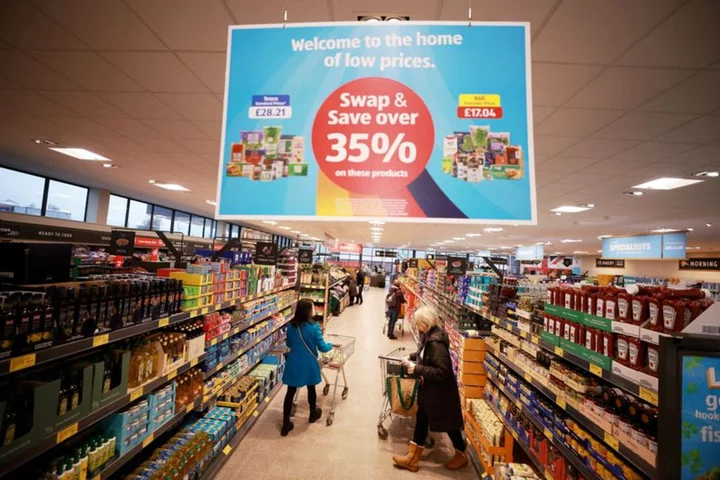By William Schomberg and David Milliken
LONDON (Reuters) -British voters are set to suffer a "living standards disaster", despite Finance Minister Jeremy Hunt's new tax cut plan, because of the unprecedented fall in household incomes over the course of a parliamentary term, a think tank said on Thursday.
Hunt offered a bigger-than-expected reduction in national insurance contributions in a budget update on Wednesday which was widely seen as helping Prime Minister Rishi Sunak to prepare for a national election that is expected in 2024.
Currently the opposition Labour Party is around 20 percentage points ahead of the Conservatives in opinion polls.
But Hunt's 10 billion-pound ($12.5 billion) giveaway is dwarfed by 90 billion pounds of tax increases announced over the current parliament, including Hunt's decision to freeze income tax thresholds a year ago which will push more earners into higher tax brackets, the Resolution Foundation said.
"This parliament is set to achieve a truly grim new record: the first in which household incomes will be lower at its end than its beginning," Torsten Bell, chief executive of the Resolution Foundation, said.
The think tank said household disposable income per person was expected to fall 1.5% in 2024, when adjusted for Britain's still high rate of inflation. If there is an election, this will be the first such fall in an election year since 1974.
Between December 2019, when Britain's last national election took place, and January 2025, the latest that the next election can take place, households were due to be poorer by an average of 1,900 pounds, or 3.1%, the think tank said.
"The challenges facing Britain in the 2020s might make things difficult for policy-makers, wrestling as they must with the testing interaction between the economic and political cycle," the Resolution Foundation said in its report.
"But those challenges have also made things far more difficult for households: this is what a living standards disaster looks like."
Gareth Davies, one of Hunt's junior ministers, said tax thresholds had risen sharply under previous Conservative-led administrations since 2010, helping many earners, but the COVID-19 pandemic had brought unavoidable costs.
"We fundamentally believe as a government that you should pay back your debts. And that then means having to make some really difficult decisions when it comes to public spending but also raising revenue," he told Reuters.
While real-terms spending is rising overall, high inflation means budgets will now fall faster for many public services outside the protected areas of health, schools and defence.
The Institute for Fiscal Studies, a think tank, said the tight spending implications of Hunt's latest plans potentially undermined his aim of boosting growth and mean Wednesday's tax cuts may prove unsustainable.
"The answer isn't always more money. It's about being more productive. That's what a business would do, and we have to apply that to the public services as well," Davies, who is Exchequer Secretary to the Treasury, said.
($1 = 0.8025 pounds)
(Reporting by David Milliken and Bill Schomberg; Editing by Sharon Singleton)

